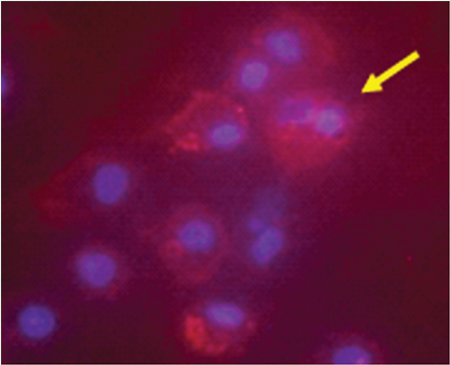anti-IDO (human) pAb
| Code | Size | Price |
|---|
| AG-25A-0029-C100 | 100 ug | £282.00 |
Quantity:
Prices exclude any Taxes / VAT
Overview
Host Type: Rabbit
Antibody Clonality: Polyclonal
Regulatory Status: RUO
Target Species: Human
Applications:
- Enzyme-Linked Immunosorbent Assay (ELISA)
- Flow Cytometry
- Immunocytochemistry (ICC)
- Western Blot (WB)
Shipping:
-20°C
Storage:
-20°C
Images
Documents
Further Information
Alternate Names/Synonyms:
Indoleamine 2,3-dioxygenase 1; IDO; INDO
Concentration:
1mg/ml
EClass:
32160000
Form (Short):
liquid
Formulation:
Liquid. 0.2µm-filtered solution in PBS, pH 7.4. Contains no preservatives.
Handling Advice:
After opening, prepare aliquots and store at -20°C.Avoid freeze/thaw cycles.
Immunogen:
Recombinant human IDO1.
Long Description:
Polyclonal Antibody. Recognizes human IDO. Detects a band of ~45kDa by Western blot. Source: Rabbit. Applications: ELISA, FACS, ICC, WB. Liquid. 0.2µm-filtered solution in PBS, pH 7.4. Contains no preservatives. IDO catalyzes the first and rate-limiting step in the main pathway of human tryptophan catabolism, the kynurenine pathway. Proinflammatory mediators, such as endotoxin and IFN-gamma induce the expression of IDO in several tissues. IDO-dependent suppression of T-cell responses might function as natural immunoregulatory mechanism. Physiological IDO activity has been implicated in T-cell tolerance to tumors, dysfunctional selftolerance in non-obese diabetic (NOD) mice, and as a protective negative regulator in autoimmune disorders.
NCBI, Uniprot Number:
P14902
Package Type:
Plastic Vial
Product Description:
IDO1 is a heme enzyme that catalyzes the first and rate-limiting step in the main pathway of human tryptophan catabolism, the kynurenine pathway, causing depletion of tryptophan which can lead to halted growth of microbes as well as T cells. IDO1 is an immune checkpoint protein, thought to play a role in a variety of pathophysiological processes such as antimicrobial and antitumor defense, neuropathology, immunoregulation and antioxidant activity. Cancer cells are able to evade the immune system is by hijacking the checkpoint proteins. Increased IDO1 protein levels drive growth arrest and apoptosis of the effector T cells, a group of immune cells that mediate the immune system?s ability to destroy pathogens. By reducing the number of effector T cells, IDO1 overexpression prevents the immune system from effectively destroying cancer cells. IDO1 overexpression has been observed in a wide range of human cancers such as prostatic, colorectal, pancreatic, cervical, gastric, ovarian, head or lung cancer. Physiological IDO1 activity has been implicated in T cell tolerance to tumors, dysfunctional selftolerance in non-obese diabetic (NOD) mice, and as a protective negative regulator in autoimmune disorders.
Source / Host:
Rabbit
Specificity:
Recognizes human IDO1. Detects a band of ~45kDa by Western blot.
Transportation:
Non-hazardous
UNSPSC Category:
Primary Antibodies
UNSPSC Number:
12352203
Use & Stability:
Stable for at least 6 months after receipt when stored at -20°C.
References
HIV inhibits CD4+ T-cell proliferation by inducing indoleamine 2,3-dioxygenase in plasmacytoid dendritic cells: A. Boasso, et al.; Blood 109, 3351 (2007) | Functional Alteration of the Lymphoma Stromal Cell Niche by the Cytokine Context: Role of Indoleamine-2,3 Dioxygenase: H. Maby-El Hajjami, et al.; Cancer Res. 69, 3228 (2009) | A novel cancer therapy by skin delivery of indoleamine 2,3-dioxygenase siRNA: M.C. Yen, et al.; Clin. Cancer Res. 15, 641 (2009) | Indoleamine 2,3-dioxygenase-expressing leukemic dendritic cells impair a leukemia-specific immune response by inducing potent T regulatory cells: A. Curti, et al.; Haematologica 95, 2022 (2010) | The indoleamine-2,3-dioxygenase (IDO) inhibitor 1-methyl-D-tryptophan upregulates IDO1 in human cancer cells: C.A.Opitz, et al.; PLoS One 6, e19823 (2011) | Melanoma cells inhibit natural killer cell function by modulating the expression of activating receptors and cytolytic activity: G. Pietra, et al.; Cancer Res. 72, 1407 (2012) | Inhibition of Indoleamine-2,3-dioxygenase (IDO) in Glioblastoma Cells by Oncolytic Herpes Simplex Virus: B. Reinhart, et al.; Adv. Virol. 2012, 815465 (2012) | An Autocrine Cytokine/JAK/STAT-Signaling Induces Kynurenine Synthesis in Multidrug Resistant Human Cancer Cells: I. Campia, et al.; PLoS One 10, e0126159 (2015) | Tumor indoleamine 2,3-dioxygenase (IDO) inhibits CD19-CAR T cells and is downregulated by lymphodepleting drugs: S. Ninomiya, et al.; Blood 125, 3905 (2015) | Targeting of Janus Kinases Limits Pro-Inflammatory but Also Immunosuppressive Circuits in the Crosstalk between Synovial Fibroblasts and Lymphocytes: N. Yao, et al.; Biomedicines 9, 1413 (2021)



